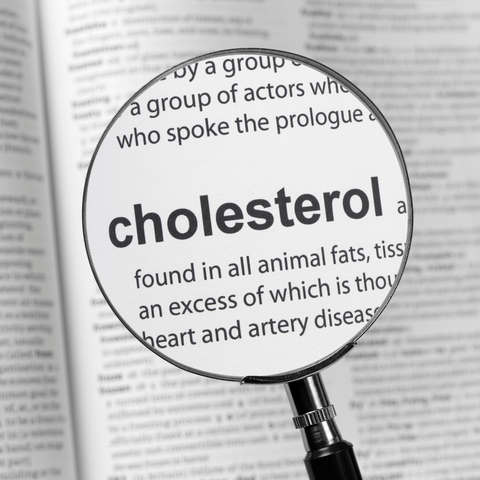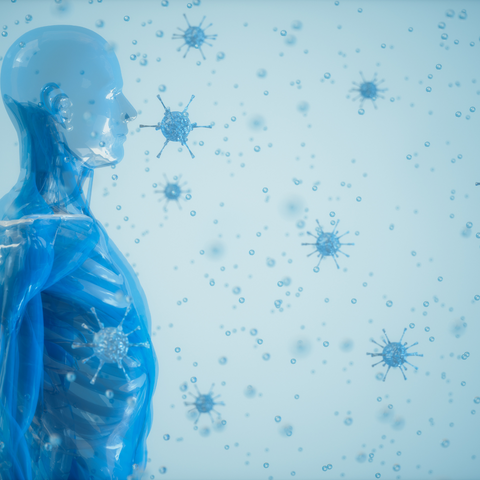The ketogenic diet is an incredible way of losing weight, although such a major change to your diet can impact your cholesterol levels. Your body needs cholesterol to keep your cells healthy, and having too much or too little cholesterol can be harmful. Whilst the effects of low-carb or keto diets on cholesterol levels vary from person to person, it is important to learn about the possible consequences of switching up your diet.
What is cholesterol?
Cholesterol is a lipid, or a waxy, fat-like substance that circulates in your bloodstream. It’s transported by lipoproteins - protein-carrying particles. The liver produces cholesterol, and cells all around your body use it for a variety of bodily functions.
The main functions of cholesterol are:
- Producing bile - cholesterol is converted into bile acids in our liver, an alkaline fluid that helps with absorbing fats and essential vitamins including vitamin A, D, E and K.
- Hormone synthesis - cholesterol is essential for producing hormones such as vitamin D which helps maintain the health of your teeth, bones and muscles. Cholesterol also helps produce steroid hormones, including testosterone and oestrogen, which aid metabolism, immune function as well as the development of the reproductive system.
- Cell formation - cholesterol helps form the membrane, or outer layer, of every cell in our body. This means that cholesterol is essential for maintaining the structure and fluidity of cells.
Where is cholesterol made?
Cholesterol found in your blood is mainly made in the liver (80%) and some cholesterol can come from the food we eat. Cholesterol is found in fatty meats or whole-milk dairy, such as eggs and cheese. These contain a small amount of cholesterol, whilst some types of organ meats and shellfish contain high levels of cholesterol and low levels of fat.
How does cholesterol work in the body?
Cholesterol can’t travel within your blood just as it is. It is hydrophobic, meaning it repels water! This is where lipoproteins come in.
Let’s think of lipoproteins as lil ships that let cholesterol on board and help them travel around the bloodstream. So we can say that blood cholesterol levels refers to the number of passengers on-board, or the number of cholesterol within various lipoprotein particles.
The lipoproteins also carry other proteins including: apolipoproteins and triglycerides.
There are two types of apolipoproteins:
- Apolipoprotein A
- Apolipoprotein B100 - otherwise called Apo B.
Now, stick with us here.
There are different terms for when these apoliproproteins are packaged alongside cholesterol:
- Cholesterol & apolipoprotein A - called HDL, or HDL-C (high-density lipoprotein)
- Cholesterol & apoliproprotein B - called LDL, or LDL-C (low-density lipoprotein)
HDL & LDL may seem familiar to you. You may have heard ‘good’ and ‘bad’ cholesterol levels in relation to illness. In reality, there is only one cholesterol and it is neither good or bad. HDL & LDL levels show how much cholesterol is carried by these lipoproteins.
LDL, or the ‘bad’ cholesterol is dangerous at high levels as it has been linked to increasing risk of heart disease. HDL, or the ‘good’ cholesterol, at low levels has also been linked to increasing risk of heart disease. As such, your LDL levels should ideally be low and HDL levels should stay higher.
LDL and HDL are both crucial in enabling crucial bodily functions. For example, studies show LDL helps in immune function.
All in all, HDL and LDL are not necessarily ‘good’ or ‘bad’. Depending on particular circumstances, HDL and LDL play both good and bad roles in your body.
What are healthy cholesterol levels?
In the UK, cholesterol components are measured in millimoles per litre of blood (mmol/L). The following measurements are ideal for adults:
- Total cholesterol - below 5 mmol/L
- HDL cholesterol - for men above 1 mmol/L, or for women above 1.2 mmol/L
- LDL cholesterol - below 3 mmol/L
- TC:HDL ratio - best if lower, ideally below 6 mmol/L
- Triglycerides - below 2.3 mmol/L (non-fasting), or below 1.7 mmol/L (fasting)
Remember that these figures are simply a guide and your doctor can tell you figures that are specific to you! You can always check your current cholesterol levels by getting a blood test at your local GP.
How can keto or low-carb diets impact cholesterol levels?
You must be wondering, what’s the big deal if we already have plenty of cholesterol in our bodies?
Well, it’s quite easy to raise cholesterol levels. Some factors that impact cholesterol levels include:
- A diet that is high is saturated fats
- An inactive lifestyle, where the fats you eat cannot be used for energy
- Genetics which cause fats to be processed in an abnormal way
A low-carb or ketogenic diet fits into the first point! Most ketogenic diets allow foods high in saturated fat and cholesterol, including fatty meats, processed meats, butter, cheese, cream and lard, alongside sources of unsaturated fats, such as seeds, avocados, plant oils, oily fish and nuts.
As such, it is easy for the keto diet to be very high in saturated fat and cholesterol, and low in foods that are good for the heart, or cardio-protective, such as legumes, fibre-rich starchy vegetables, whole grains and many fruits.
Whilst keto can be beneficial for your health, it is important to make sure you’re following the right type of keto diet as it is easy to fall into a loophole of eating the wrong foods and harming your body.
When your low-carb or keto diet is full of saturated fats, a rise in HDL cholesterol is quite common. A study compared a group following a keto diet to a group sticking to a low-fat diet, and found that the keto diet group showed lowered triglyceride levels and increased HDL cholesterol levels compared to the low-fat diet group.
The majority of studies show that the keto diet can raise both LDL and HDL cholesterol levels, although other studies show groups experiencing a rise in LDL cholesterol and a fall in HDL cholesterol.
Clearly, the impact of keto or low-carb diet on cholesterol levels varies from person to person.
Should this be of concern for you?
Whilst increased levels of LDL cholesterol are concerning for most experts, research consistently shows that the ketogenic diet helps reduce factors related to heart disease amongst people with diabetes and other insulin-related health conditions.
A study monitored people with obesity following the ketogenic lifestyle for over 6 months and found that they had lost plenty of weight and had healthier cholesterol levels. Although these results are based on those with obesity, and so may not apply to those of us without such circumstances.
Because of how varied the results are, it’s best to look at your own cholesterol levels and evaluate whether you can take on the diet without harming your body.
What are the symptoms of high cholesterol?
High cholesterol usually causes zero symptoms. Our body will only show the extreme consequences of high cholesterol, including a heart attack or stroke.
Such extreme cases only occur further down the line, once your increased levels of cholesterol cause plaque to form in your arteries. This plaque narrows the arteries, prevent blood from circulating through. This is where it all goes downhill, as your entire arterial lining is changed because of all the plaque, leading to extreme complications.
A blood test is the only method of finding out if your cholesterol levels are too high. You’ll have to take a trip to your doctors, where they can give you a cholesterol test if you’re 20 years old or older. A cholesterol test is also known as a lipid panel or lipid profile, and this will give you a reading of your triglycerides levels as well as your LDL & HDL cholesterol levels in your blood. You should then get your cholesterol levels checked at least every 4 to 6 years.
If you have a family history of high levels of cholesterol or have any of the following risk factors, your doctor will most likely suggest you should have your cholesterol checked more often:
- Overweight
- High blood pressure
- Smoke
How to lower cholesterol levels back to normal
Are you already on the keto or low-carb diet and found that your cholesterol levels have increased? Luckily for you, it’s quite easy to lower cholesterol levels back to normal.

1. Reducing intake of fatty caffeine drinks
2. Avoiding overeating
Curious to learn more about intermittent fasting? Keep an eye out on our upcoming blog posts!
But be careful! Many unsaturated oils can be very processed. Try to stick to foods or oils that are less processed, such as olive oil and macadamia oil.
4. Eat keto-friendly foods that can lower cholesterol levels
- Avocados - Research has found that eating avocados regularly reduced LDL cholesterol levels!
- Vegetables - Leafy greens and cruciferous vegetables (or veges from the cabbage family) can bind to bile acids. They are then released as waste as opposed to reabsorbing in the gut. This leads to reducing blood cholesterol ever so slightly. Want to reap the benefits of all your dark leafy greens? Studies show that steaming can improve this process and ultimately help lower cholesterol levels further.
- Cocoa or dark chocolate - Research shows that indulging a little in cocoa or dark chocolate helps lower LDL cholesterol and even protects LDL from oxidisation and damage.
- Seeds and nuts - As a source of fibre and monounsaturated fats, nuts and seeds such as chia seeds, walnuts and flax seeds can help reduce cholesterol levels. Analysis of multiple studies found that eating just two servings of nuts daily effectively lowered LDL cholesterol levels by about 7%.
6. Medication
There is medication available for higher levels of cholesterol, so you can discuss this with your doctor as an alternative option to quitting keto entirely. Though all of this depends on how high your cholesterol is and whether you’re happy to take medication in order to stick to the keto lifestyle!
How to best choose if the keto or low-carb lifestyle is right for you
We’d say the main thing to consider before choosing the ketogenic or low-carb lifestyle is your current health condition.
A simple blood test should help you find out your:
- Triglyceride levels
-
Cholesterol levels
Alongside cholesterol, another type of lipid or fat found in lipoproteins are triglycerides. Triglycerides help build cells and hormones, so they are very important for good health! If you’re keeping track of your blood pressure and cholesterol levels, triglycerides are equally as important.
Let’s outline the different levels of triglycerides:
- Normal triglyceride number - Less than 1.7 mmol/L
- Borderline high - 1.8 to 2.2 mmol/L
- High - 2.3 to 5.6 mmol/L
-
Very high - 5.7 mmol/L or above
If your figures are around the normal range, keto is probably safe for you to try.
Although, it’s a different story for those that have high triglyceride numbers and insulin resistance, type 2 diabetes or obesity. Here, trying keto or low-carb is risky and definitely not something you should rush into. We advise you speak to a medical professional before making any major changes to your diet!
2. It’s a given to check cholesterol levels before considering going low-carb or keto.
Let’s recall the normal total levels of cholesterol:- Total cholesterol - below 5 mmol/L
If your cholesterol levels are normal, then good news! Seems you can try out the keto or low-carb lifestyle with less need to worry. Although be sure to keep track of your cholesterol levels, as they can easily change!
Are your cholesterol levels too high or too low? It’s risky to try the low-carb diet, and you should consult your doctor before considering any dietary changes. Be sure to double check your LDL & HDL cholesterol levels to make sure you know where you have an imbalance.
Key Takeaways
All in all, cholesterol is an integral part of our body, and meddling with it can completely mess with your bodily functions. The low-carb or ketogenic diet can affect cholesterol levels, although this varies from person to person and can easily be prevented by eating specific foods and not overeating.
It is extremely important to consult a doctor before committing to any lifestyle change that impacts your body. Before choosing keto or low-carb, be sure to speak to a professional, especially if you have any health conditions or are taking any additional medication.
Want to read more about health and the ketogenic diet? Check out our blog post about how keto impacts the immune system, and keep an eye out for our upcoming posts about electrolytes and dehydration!
What are your experiences with cholesterol levels and dieting? Have any questions about how the keto lifestyle might impact your health? Drop a comment down below and let’s talk about it!





Comments (0)
There are no comments for this article. Be the first one to leave a message!